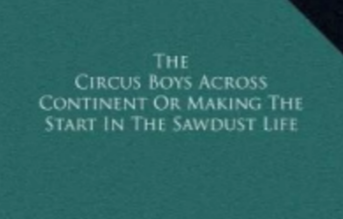CHAPTER XXIII — The Circus Boys Across the Continent
byCHAPTER XXIII — The Circus Boys Across the Continent finds Phil Forrest and his fellow performers in high spirits as they arrive in Salt Lake City, a destination unlike any they’ve seen. Fascinated by its rich culture and stunning architecture, they tour landmarks such as the imposing Mormon Temple and spend time floating in the mineral-rich waters of the Great Salt Lake. This brief pause in their rigorous schedule gives the boys a chance to marvel at the diversity of America, both natural and cultural, while strengthening their bond through shared discovery and laughter under the Western sky.
As the circus weaves its way through the towering Rockies, the troupe grows more confident in their roles, adapting to the rhythm of life on the move. Minor injuries and missed cues occur, but the boys handle them with maturity born from experience. With every new town and each performance, they sharpen their skills, maturing not just as entertainers but as young men learning discipline, adaptability, and teamwork in a demanding world.
However, the excitement of adventure is soon shadowed by a disturbing trend. Towns visited by the circus report thefts, and the show itself narrowly escapes catastrophe when someone slices through critical guy ropes in Reno. This act of sabotage nearly causes the collapse of the big top—a disaster only avoided due to a lucky shift in wind. Mr. Sparling, the circus owner, is left shaken, knowing that such threats not only endanger lives but risk the reputation of the show he has built.
Whispers point toward Red Larry, a former hand with a grudge and a history of trouble. Sparling, though cautious, begins to believe that this saboteur is targeting the circus deliberately. The pattern is too precise, the damage too calculated to be the work of chance. Tension tightens within the ranks, and performers go to sleep with one eye open, unsure whether their next show might be disrupted by another hidden danger.
Phil Forrest, never one to sit idle when harm threatens those he cares about, takes it upon himself to offer a solution. He suggests that every circus train be searched thoroughly for hidden stowaways or suspicious cargo. The idea is met with initial doubt—logistically, it’s a daunting task—but Phil’s calm and reasoned approach soon wins Mr. Sparling’s support. His belief is that Larry may be hiding within the very lifelines of the circus: the trains, which travel unnoticed from town to town and provide countless places for someone to conceal themselves.
Mr. Sparling orders the searches to be conducted at dawn. He stresses secrecy, directing that crews not be informed until the last possible moment to avoid tipping off any hidden saboteur. This decision signals not only his trust in Phil’s instincts but also his willingness to let younger members of the circus take the lead when it matters. For Phil, it is a defining moment—not of showmanship, but of quiet leadership.
The plan represents more than just a search; it marks a shift in how the circus confronts its problems. Rather than reacting to danger, they are preparing to root it out. Phil, who has grown steadily through every trial, now stands as a figure of calm intelligence in the face of growing unease. His resolve reflects the values instilled in the traveling troupe: perseverance, loyalty, and a deep commitment to protecting one another.
As morning approaches, Phil readies himself for the task ahead. He is determined to take part in the inspection personally, not out of pride, but because he knows the risks better than most. The memory of Red Larry’s past deeds still lingers, and Phil’s drive is fueled by a need to put an end to the threat once and for all. Though he is younger than many around him, his courage is unquestioned, and the others begin to see him as someone who leads through thoughtful action rather than mere words.
In the final moments of the chapter, Phil reflects quietly, sensing that a confrontation may be near. Yet, he feels prepared—not just for a fight, but for the responsibilities that come with protecting the circus family. His growth mirrors the transformation many young people experience when faced with adversity: from eager performer to brave problem-solver. His character shines not just in the spotlight of the ring, but in these backstage moments where true courage lives.
This chapter underscores how the circus is more than a collection of tents and acts—it’s a community that must defend itself from both internal and external threats. Through clever planning and trust in one another, they aim to root out deceit from within. For readers, this part of the journey reinforces the importance of vigilance and action, even when the threat hides behind familiarity and routine.
The closing tone of the narrative hints that the coming days will test them further. But if Phil’s actions are any measure, the circus has nothing to fear. It has its share of heroes—not just beneath the lights, but in the quiet shadows where loyalty, heart, and cleverness come to life.

